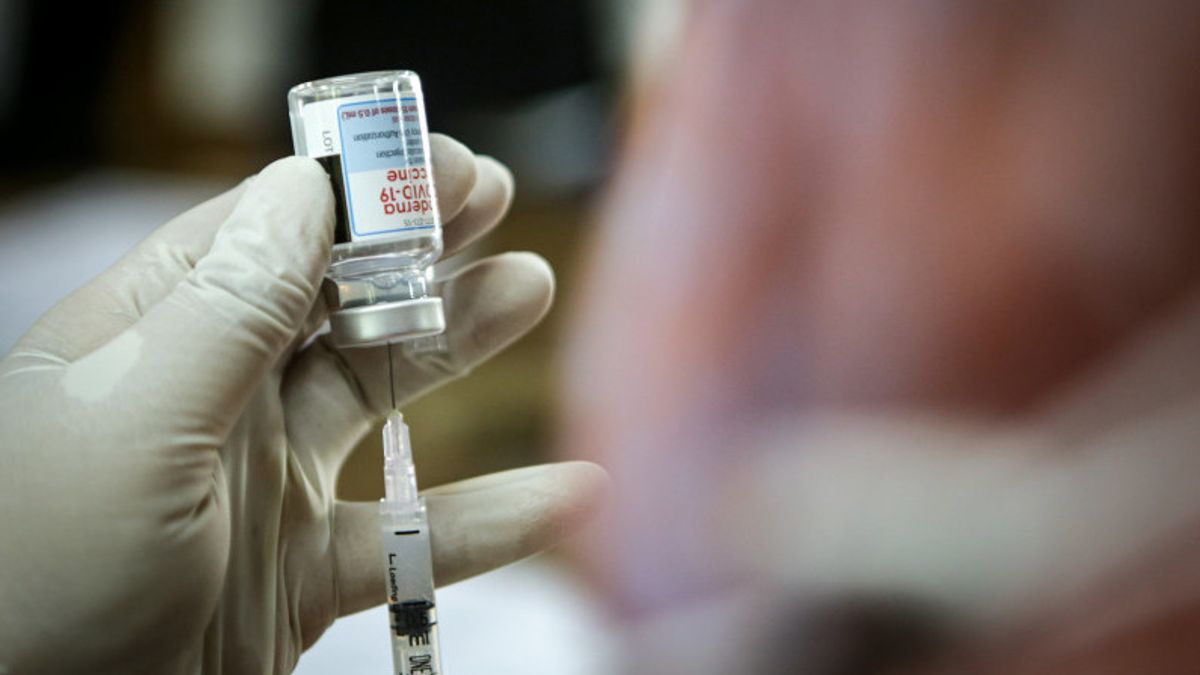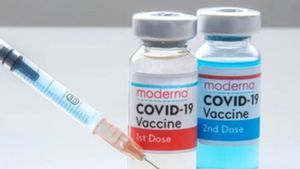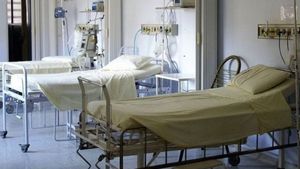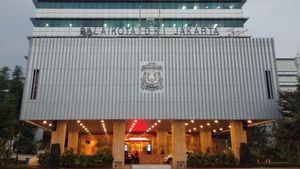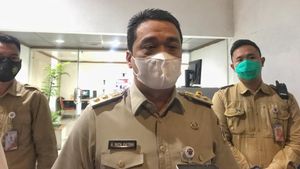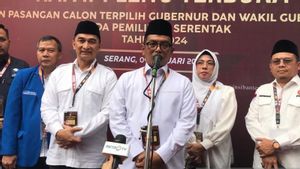JAKARTA - Health practitioner and COVID-19 volunteer from Gadjah Mada University, dr. Muhamad Fajri Adda'i revealed reactions that can occur after someone gets an injection of the Moderna COVID-19 vaccine. Correct knowledge about post-vaccine reactions is expected not to cause excessive fear.
The Moderna vaccine is planned to be used for the people of Indonesia and specifically as a booster injection for health workers in the country.
"This is not scary but provides a good understanding of the reaction to vaccination. Everyone has a different reaction so it cannot be generalized", Fajri said via electronic message, quoted from Antara, Sunday, August 8th.
The reaction experienced by each person after vaccination can be different, depending on the percentage of each symptom. These include fever, malaise, fatigue, rash, and pain.
Data from a study published in the journal JAMA on April 5, 2021, showed that in about 2 million people in the United States who were injected with Moderna, about 70 percent would feel pain, then 7.4 percent would experience redness, swelling (13.6 percent) and systemic symptoms. 51.7 percent.
In addition, there are also symptoms of fatigue (32.5 percent), headache (26.9 percent), myalgia or muscle pain (21.3 percent), chills (10.3 percent), fever (10 percent), pain joints (9.8 percent), nausea (8.1 percent), vomiting (0.8 percent), diarrhea (5.4 percent) and abdominal pain (3.2 percent).
He gave an example if 1.2 million health workers were injected with the Moderna vaccine, then 70 percent of this number or 840.000 people would complain of pain. Meanwhile, systemic symptoms will be experienced by 620.000 people, fatigue 390.000 people and rashes in 88.800 people.
In addition, according to a study in the journal JAMA Oncology, there is also a lymph node reaction, namely enlargement of lymph node vessels, for example in the armpits in men. The case is about 1-5 percent in those who were injected with the first dose of Moderna vaccine.
"This vaccine is caught in the lymph nodes, it builds immunity in the lymph nodes, so it swells. That's why the UK has informed that (swelling) can take up to 10 days or even more. But this is rare", said Fajri.
Fajri himself had received the first injection of this vaccine on Friday, August 6. He said the first 12 hours have not felt any reaction. After 14 hours of being vaccinated, then the fever and cold that can be endured will appear.
After 24 hours after being vaccinated, his condition improved but two hours later he experienced chills and malaise or tired and not feeling well.
"28 hours after being vaccinated, I couldn't stand it, I ended up taking the medicine, it was okay. The pain in my hands due to the local inflammatory reaction when I put a cold compress was pretty good", he said.
"So it is important to arrange the right vaccination schedule so that we don't share this AEFI and disrupt services (as happened in Sweden with the Pfizer vaccine)", continued Fajri.
About myocarditis after vaccination
Some time ago, the European drug regulatory agency found a possible link between rare heart inflammation and messenger RNA (mRNA)-based vaccines, including Moderna.
Responding to these findings, according to Fajri, the incidence of myocarditis like this is very small, namely 26: 1.000.000. The recorded case also occurred 4 days after being vaccinated so it is best to avoid strenuous exercise in the first weeks after being vaccinated.
The same thing was expressed by a heart and blood vessel specialist from the Indonesian Cardiovascular Specialist Association (PERKI), Dr. Vito A. Damay.
SEE ALSO:
He, through his statement, also said, the possibility of myocarditis is very small and rare after someone gets the mRNA-based COVID-19 vaccine.
COVID-19 itself causes myocarditis. Overall, people with COVID-19 had a 2.3 percent risk of developing myocarditis.
Meanwhile, people who are at risk of developing myocarditis after being injected with an mRNA-based COVID-19 vaccine are only around 0.000 percent.
"Don't worry, this is very unlikely, it's rare. Therefore, stay confident that the benefits of this vaccination far outweigh the side effects", said Vito.
Tips to relieve symptoms and after getting vaccinated
To relieve symptoms such as fever, the United States Centers for Disease Control and Prevention (CDC) recommends that you drink plenty of water and don't wear clothes that are too thick. Meanwhile, for pain, you can do a cold compress or move the arm that hurts.
If the pain is unbearable, you can take drugs such as Paracetamol. But if you can still hold it, you should hold it because anti-inflammatory drugs can affect the immune response.
According to Fajri, as one of the best COVID-19 vaccines (94.1 percent efficacy), Moderna also triggers a fairly strong body response as well as the highest antibody compared to other vaccines.
Then, if there is a suspicion of shortness of breath, chest palpitations, chest pain, you should consult a cardiologist so that you get immediate treatment.
In addition, after being vaccinated, follow a healthy lifestyle, such as getting enough rest and consuming balanced nutritious food and drinks, not staying up late for the next few weeks, not smoking, drinking alcoholic beverages.
Fajri reminded, the formation of optimal immunity takes up to one month after the first dose of Moderna vaccination, although this varies from individual to individual. Therefore, apply a minimum healthy lifestyle for both young adults and the elderly.
The English, Chinese, Japanese, Arabic, and French versions are automatically generated by the AI. So there may still be inaccuracies in translating, please always see Indonesian as our main language. (system supported by DigitalSiber.id)
